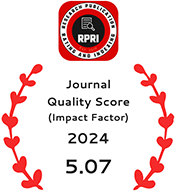T. S. Eliot and Eastern Spirituality
DOI:
https://doi.org/10.55544/jrasb.2.1.32Keywords:
Eliot's lifestyle, Religion, Spirituality, Eastern philosophyAbstract
Eliot's lifestyle exemplifies his religion. The community that the book provides enables not just Eliot to gratify his own aspirations but also enables others to arrive at similar realizations and locate their place. The work is the culmination of Eliot's lengthy quest for structure and wonder in literature. In spite of Eliot's assertion that the letter in question is neither a manifesto nor a plea to society, its contents suggest otherwise. This work is a reflection of his quest to comprehend the inexplicable as well as his transition from Eastern philosophy, which he explored in The Waste Land and Four Quartets, to Western Christianity, which he adhered to until the very end of his life. The world we live in today is ethically bankrupt, and as a result, the physical takes precedence over the spiritual. The end outcome is a psychological imbalance, a crisis, and decadence. The contemporary surroundings of the waste landers and their unthinking dedication to want, which they believe will fill the gap in their psyches, are the root causes of the spiritual conflict that they face. The poet is looking for psychological coherence. The progression from "The Burial of the Dead" to "What the Thunder Said" alludes to the idea of an individual's eventual salvation from within. The ending of "The Waste Land" ushers in a new way of being in the world. Religion helps the contemporary man find transcendence, inner quiet, and coherence in a time when science, atheism, and sexual liberation are the prevailing worldviews. Religion has the power to ease the suffering of the person and unite his fragmented self into a unified and harmonious whole. Eliot looks to several religious practices for comfort. The idea of travel plays a significant role throughout Eliot's poem. When seen through the lens of an individual's pursuit of psychological and spiritual wholeness, the poem demonstrates forward movement.
Downloads
References
Eliot, T. S. (1971). So Through the Evening, Through the Violet air. In Valerie Eliot (ed.), The Waste Land: A Facsimile and Transcript of the Original Drafts. London: Faber and Faber Ltd.
Eliot, T. S. (1964). Knowledge and Experience in the Philosophy of F. H. Bradley. London: Faber and Faber.
Eliot, T.S. (1968). The Waste Land. In The Waste Land and Other Poems, London: Faber and Faber, 1968.
Freud, Sigmund. (2002). Leonardo Da Vinci: A Memory of his Childhood. New York: Taylor & Francis.
Miller, Maelowe A. (2006). Masterpieces of British Modernism. London: Greenwood Press.
Eliot, Thomas Sterns. Christianity and Culture. New York: Harcourt, Brace and world, Inc., 1968
Eliot, Valerie, ed. The Letters of T.S. Eliot, Volume I. London: Harcourt Brace Jovanovich, 1988.
Fabricius, Johannes. The Unconscious and Mr. Eliot. Copenhagen: NYT Nordisk Forlag Arnold Busck, 1967.
Jarman, Mark. “The Body on Fire, the Soul in Flight.” Kenyon Review. 23. (2001): 222. Academic Search Elite.
Kenner, Hugh, ed. T.S. Eliot, A Collection of Critical Essays. New Jersey: Prentice-Hall Inc., 1962.
Kimball, Roger. “A Craving for Reality: T. S. Eliot Today”. New Criterion. 18. (1998): 18. EBSCOhost.
Madrigal, Ramón. San Juan de la Cruz, una Visión de Dios. San Pedro de Montes de Oca, Universidad de Costa Rica, Facultad de Letras, Escuela de Filosofía, 1976.
Martínez Vicente. El Hombre Interior. San José: Publicaciones del Centro de Espiritualidad San Juan de la Cruz, 1991.
Downloads
Published
How to Cite
Issue
Section
License
Copyright (c) 2023 Dr. Ravindra Kumar Singh

This work is licensed under a Creative Commons Attribution-NonCommercial-NoDerivatives 4.0 International License.


















